[Herald Interview] Canadian veterans reminisce on hockey games in Korean War
“Hockey brought us closer to home, because we were playing our national game. This year, hockey brings us back to Korea. Everyone became one, not just those soldiers who played hockey, but also those who watched from the sidelines.”
By Joel LeePublished : Jan. 22, 2018 - 18:54
The winter of early 1952 was cold enough to freeze the Imjin River that cuts across the inter-Korean border.
The frigid weather let Canadian soldiers fighting in the Korean War indulge in their national pastime: ice hockey.
In the thick of war, soldiers from the regiments Princess Patricia’s Canadian Light Infantry and the Royal 22 Regiment, the “Van Doos,” put down their rifles and played a series of friendly hockey matches.
The games were a precious respite from savage warfare.
“I remember playing hockey like yesterday in January of 1952,” said Dennis Moore, in an interview in Seoul on Thursday.
The frigid weather let Canadian soldiers fighting in the Korean War indulge in their national pastime: ice hockey.
In the thick of war, soldiers from the regiments Princess Patricia’s Canadian Light Infantry and the Royal 22 Regiment, the “Van Doos,” put down their rifles and played a series of friendly hockey matches.
The games were a precious respite from savage warfare.
“I remember playing hockey like yesterday in January of 1952,” said Dennis Moore, in an interview in Seoul on Thursday.
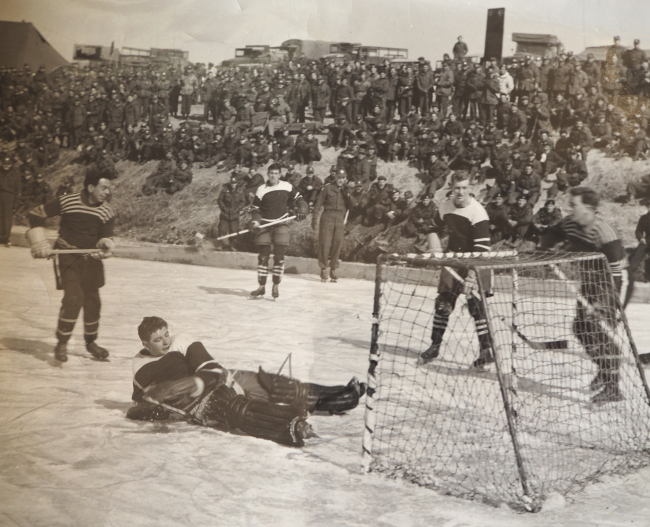
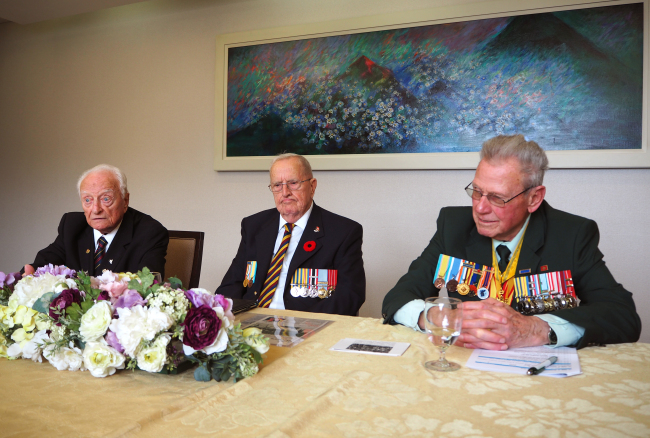
Moore, who fought with the PPCLI, was joined by other Korean War veterans who took part in the games -- Claude Charland, a former officer with the Van Doos, and John Bishop, a former PPCLI officer who served 38 years in the Canadian military. They were in Korea to watch a match between Korean students and current soldiers from their units, held on almost exactly the same site, to mark the 65th anniversary of the end of the war this year.
“Then-Minister of National Defense Brooke Claxton came to Korea in November 1951, and told soldiers that he will send hockey equipment to Korea from Canada. People didn’t believe him at that time, but the equipment arrived shortly after,” said Moore. “We started playing in January of 1952. It didn’t matter who won the game. We were having a good hockey game.”
The games were played a mere five-minute Jeep ride from the front line, according to Moore, and spectators from different countries, including Korean farmers from nearby villages, watched on and cheered from the sidelines.
“Hockey brought us closer to home, because we were playing our national game,” said Charland. “This year, hockey brings us back to Korea. Everyone became one, not just those soldiers who played hockey, but also those who watched from the sidelines.”
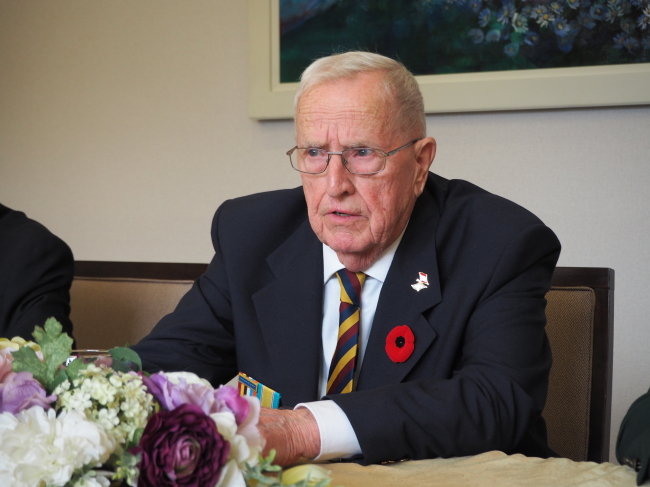
The most difficult aspect of fighting the war was dealing with the inclement weather, which became bone-chilling in winter, said Moore. “The hardest part was trying to stay warm. We froze our ass off and ate cold food.”
The Canadians -- part of the 1st Commonwealth Division -- were mostly involved in defensive rather than offensive operations at the time, he explained, adding that all Canadians were volunteer soldiers.
Canada contributed more than 26,000 troops to the war as the third-largest national contributor to the United Nations Forces. Of them, 516 died, including 312 directly in combat. The major battles that they fought in include the Battle of Gapyeong in 1951 and the Battle of Imjin River in 1952.
Charland said he led his first patrol as lieutenant in March 1952, during which he and his soldiers were ambushed and embroiled in hand-to-hand combat.
“We managed to come back with five wounded but no soldiers killed. It was an accomplishment under the circumstances,” he added.
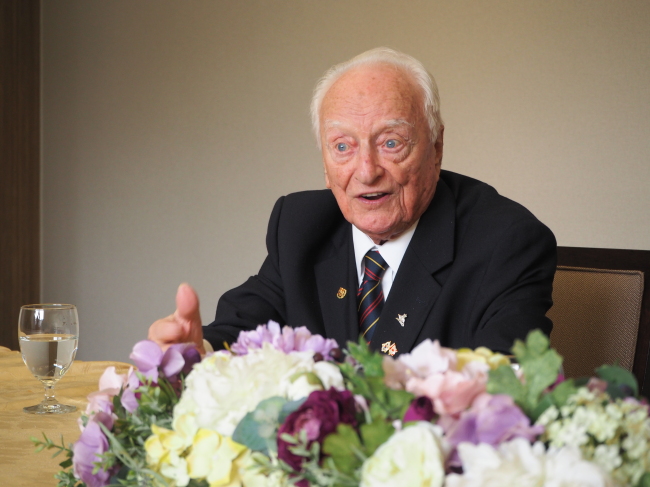
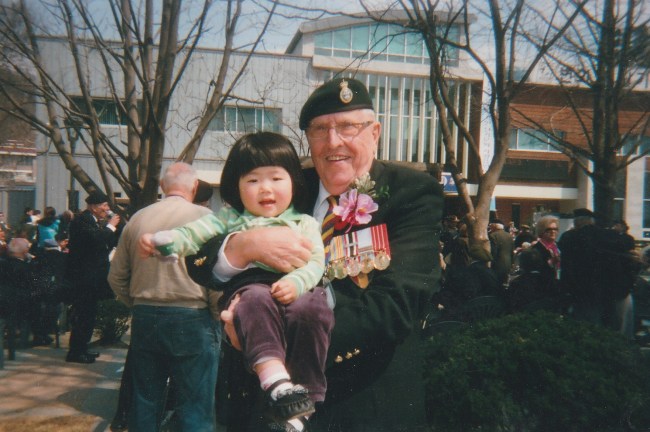
Charland, who went on to become a colonel, said the soldiers “lived like rats,” toughing it out in the trenches and bushes, while doing what they could to keep themselves hygienic.
“But despite all of our misery, we kept a good morale. That’s why hockey was so important to us,” Charland highlighted. “When we got goodies from back home, we shared it amongst ourselves. Each regiment battalion interacted with locals in different ways, giving them food and taking care of orphans.”
The three veterans, with medals pinned to their jackets, offered guarded optimism for the divided Korean Peninsula.
“The two Koreas will become one country again. I have no doubt. And who will make that happen are the Korean people. Never mind anyone else,” Moore said.
Charland agreed.
“You can’t permanently have a situation like the Korean Peninsula, where two opposing regimes are facing one another under such a hostile environment,” he said. “When we look at how South Korea has developed since the war, we can say that, ‘Fine, we lost 516 Canadians, but it was worthwhile. That’s it. What’s next is out of our hands.”
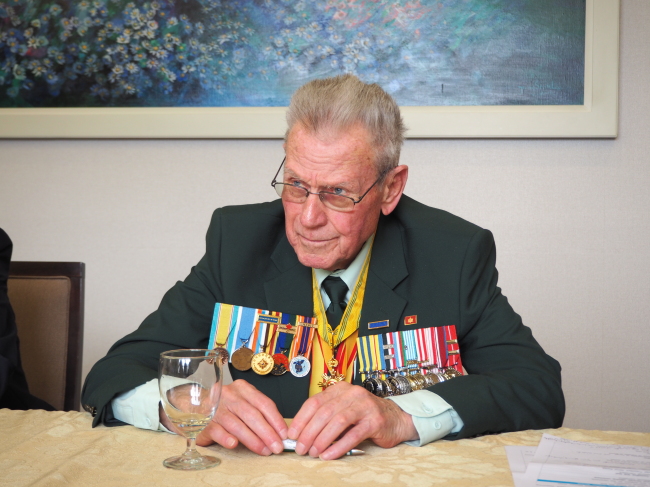
Bishop, who returned to South Korea as a military attache and Canada’s representative at Panmunjeom from 1982-1984, warned against the escalating tension between Pyongyang and Washington.
“The number of casualties from a hypothetical attack by the United States on the North would be catastrophic, in the millions, merely from the artillery and conventional weapons,” he forecast.
On Friday, soldiers from the two units played hockey games against a joint team of players from Korea University and Yonsei University at Yulgok Wetland Park in Paju, Gyeonggi Province, near the original site of the Imjin games.
As well as the 65th anniversary of the end of the war, the event marked the 90th anniversary of the first recorded hockey games in Korea ahead of the PyeongChang Olympic and Paralympic games.
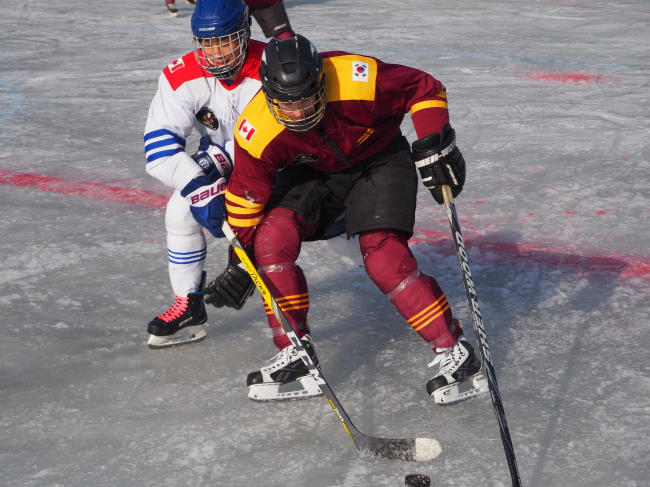
The wartime games have secured their place in history. The Imjin River Memorial Cup has been held every year among Canadians in Korea, and the annual outdoor Imjin Classic was played for the first time on the Rideau Canal in Ottawa in 2013, the 50th year of diplomatic relations between Canada and Korea.
Friday’s games and other related ceremonies, attended by Canadian Ambassador Eric Walsh, PyeongChang 2018 Organizing Committee officials and other dignitaries, were jointly organized by the Canadian Embassy in Seoul and the city government of Paju. Korea’s Ministry of Patriots and Veterans Affairs financially supported the visit of the three veterans.
By Joel Lee (joel@heraldcorp.com)
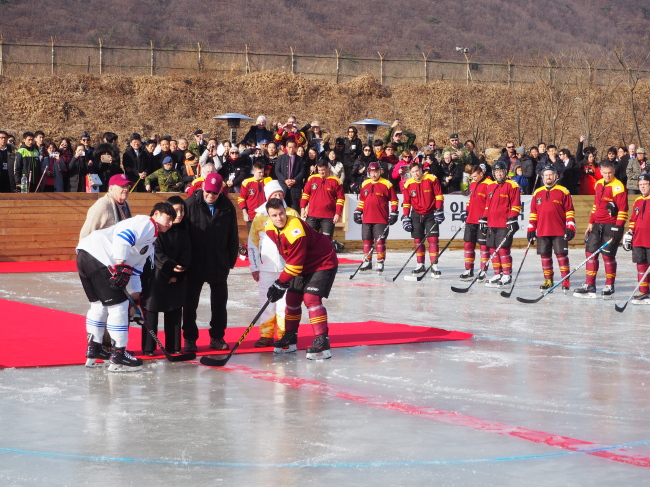



















![[Today’s K-pop] BTS pop-up event to come to Seoul](http://res.heraldm.com/phpwas/restmb_idxmake.php?idx=642&simg=/content/image/2024/04/17/20240417050734_0.jpg&u=)